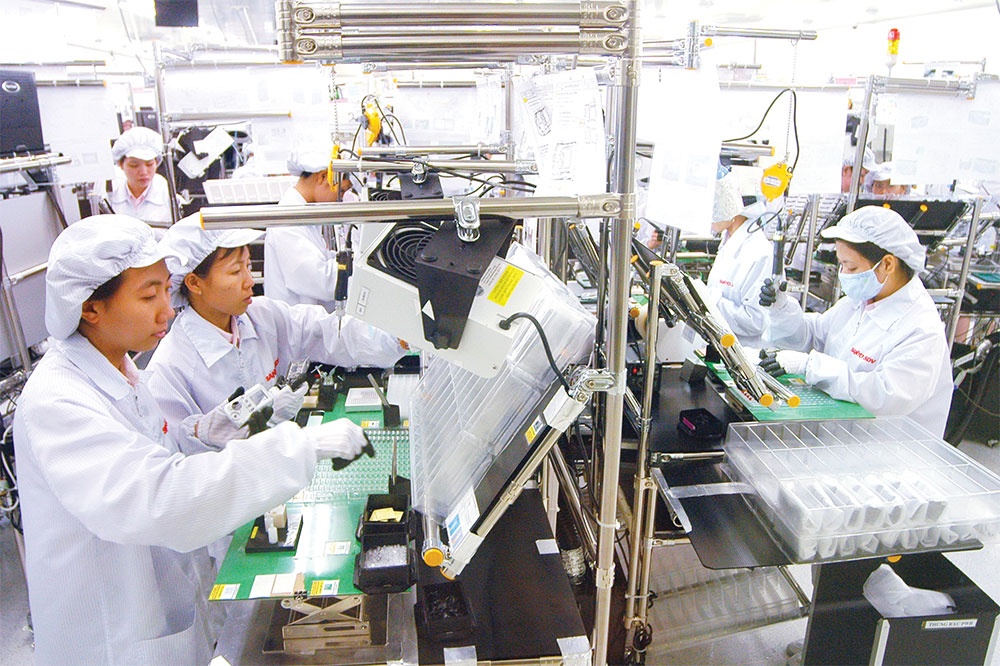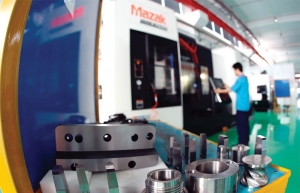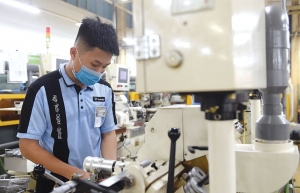Foreign-invested enterprises face up to procedural barriers
Foreign-invested enterprises (FIEs) are using both direct and indirect channels to reflect their concerns about these barriers to the prime minister.
 |
| While some foreign-invested enterprises are looking for tax changes, quick regulation alterations can also cause issues. Photo: Le Toan |
Seck Yee Chung, vice chairman of the Singapore Business Group (SBG), said in a meeting between Prime Minister Pham Minh Chinh and FIEs on September 17 that the business of many SBG members was being impacted by the protracted timeline to get a business licence. “The licensing procedure and timing for FIEs to obtain such sub-license is burdensome and time-consuming. Typically, this involves several rounds of submissions and follow-up questions with the Ministry of Industry and Trade (MoIT) and localities’ department of industry and trade. This can take anywhere from 4 to 12 months,” Chung said.
Members of the SBG take one year to get a licence for trading and wholesale distributing lubricating oil from the departments of industry and trade in various localities. “Meanwhile, according to the regulations, it should only take 13 days. If the departments want further comments from the MoIT, they need an additional 28 days,” he added.
The Singapore business community has requested that the government considers enacting regulations to shorten the regulatory timeline for approvals. In the meantime, they also request agencies to observe the current regulatory timeline for the issuance of the business licence and to be clearer as to what is expected in the application dossier to reduce the number of follow-up rounds.
Along with timeline problems for licences, foreign investors are concerned that the overlap in regulations is forming a roadblock impacting future investment in the country.
Bosch Vietnam is an example. The group lost part of its tax incentive due to a lack of consistency and clarity in implementing regulations. While the Law on Investment considered Bosch’s manufacturing investment a “new investment,” the Law on Corporate Income Tax evaluated it as an “expansion investment,” leaving Bosch with a less attractive tax incentive scheme.
“Quick regulation changes can pose difficulties for companies to follow and for the tax authority to implement. Our tax incentive was challenged during a tax inspection in 2019, justified with regulations that were issued after the time of our investment. We believe this is not in line with the investment protection principle stipulated in the Law on Investment, which allows investors to keep the awarded incentives when less favourable schemes are issued,” said managing director of Bosch Vietnam Dominik Meichle.
A reliable regulatory environment that ensures necessary protection for investors would help to bolster confidence for future investment, Meichle explained. “Bosch would be grateful for the prime minister’s support in resolving this incentive issue. As the problem emerged from the inconsistency between different legislations, we strongly recommend that the lawmaking body scrutinises it with input from ministries and authorities.”
Along with direct comments, the prime minister often receives documents from associations, international organisations, and businesses about their investment obstacles.
Early this month, the Ho Chi Minh City Export Processing and Industrial Zones Management Authority’s (HEPZA) Business Association submitted a document to the prime minister to seek solutions to shortcomings related to environmental impact assessment (EIA) reports.
According to the association, the Ministry of Natural Resources and Environment must guide the local people’s committees to authorise and assess industrial zones management authorities and give guidance on forms of relevant documents related to assessment or approval for EIAs.
The association reflected that this regulation is to create a one-door mechanism to save time for enterprises. However, the regulation effectively creates a barrier, prolonging the timeline to complete business procedures. To get approval on the EIA from park authorities, enterprises need to get a sub-licence from the departmentof Construction, and Natural Resources and Environment, which is time-consuming.
“Many businesses have trouble when carrying out legal procedures related to the EIA. For example, Sunshine Tech Commercial Investment JSC Ho Chi Minh City Branch wanted to be renamed Unicloud Company, but failed because it could not get the EIA licence for two years. Many more of our member businesses also face the same situation,” said Nguyen Van Be, chairman of the HEPZA’s Business Association.
Responding to consultation with FIEs, Minister of Planning and Investment Nguyen Chi Dung said that the ministry would cooperate with other authorities and localities to resolve obstacles for such enterprises so they can feel secure in their long-term investment in Vietnam.
“For shortcomings caused by policy implementation, localities need to report problems that exceed their authority to the relevant agencies to thoroughly resolve issues and avoid a persistent backlog of difficulties,” Dung said.
| The majority of FIEs are pleased with the investment environment in Vietnam. The result of a quick survey implemented by the Ministry of Planning and Investment and the Vietnam Business Forum in September shows that over 90 per cent of enterprises achieved medium and high business efficiency and financial status. Almost all businesses expressed their optimism and confidence in Vietnam and commitment to continue to expand investment and long-term business. Over 65 per cent of enterprises have plans to expand their investment in 2023. A total of 76 per cent of enterprises appreciate the effectiveness of the government’s production and business supporting policies (such as tax exemption and reduction, fees, price stabilisation, work permits, import and export policies, and vaccination against coronavirus). The most effective policies are VAT exemption and reduction, petrol price stabilisation, and improvement on work permit and clearance procedures. |
 | FIEs upholding equality in workplace Approaching and solving gender issues on the basis of respect for diversity and difference is a strategy being pursued by many foreign-invested enterprises in Vietnam in order to establish an equal working environment with inclusive benefits for all staff. |
 | MoF clarifies law on prize electronic games for foreigners The Ministry of Finance has issued further guidance on the law regarding foreigners and prize electronic games in Vietnam. |
 | Domestic companies striving to become trusted vendors of FIEs Numerous foreign-invested enterprises are looking for more Vietnamese vendors, but domestic companies are being encouraged to make improvements before they can effectively climb global supply chains. |
 | FIEs seek streamlined workforce policy The human resources of Vietnam are improving to meet the demand of foreign-invested enterprises. However, they may require stronger policies on visas to enhance performance and transfer high technologies to Vietnam |
What the stars mean:
★ Poor ★ ★ Promising ★★★ Good ★★★★ Very good ★★★★★ Exceptional
Related Contents
Latest News
More News
- VNPAY and NAPAS deepen cooperation on digital payments (February 11, 2026 | 18:21)
- Vietnam financial markets on the rise amid tailwinds (February 11, 2026 | 11:41)
- New tax incentives to benefit startups and SMEs (February 09, 2026 | 17:27)
- VIFC launches aviation finance hub to tap regional market growth (February 06, 2026 | 13:27)
- Vietnam records solid FDI performance in January (February 05, 2026 | 17:11)
- Manufacturing growth remains solid in early 2026 (February 02, 2026 | 15:28)
- EU and Vietnam elevate relations to a comprehensive strategic partnership (January 29, 2026 | 15:22)
- Vietnam to lead trade growth in ASEAN (January 29, 2026 | 15:08)
- Japanese business outlook in Vietnam turns more optimistic (January 28, 2026 | 09:54)
- Foreign leaders extend congratulations to Party General Secretary To Lam (January 25, 2026 | 10:01)

 Tag:
Tag:




















 Mobile Version
Mobile Version